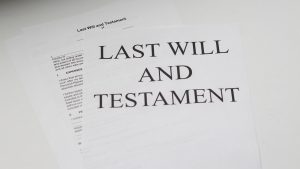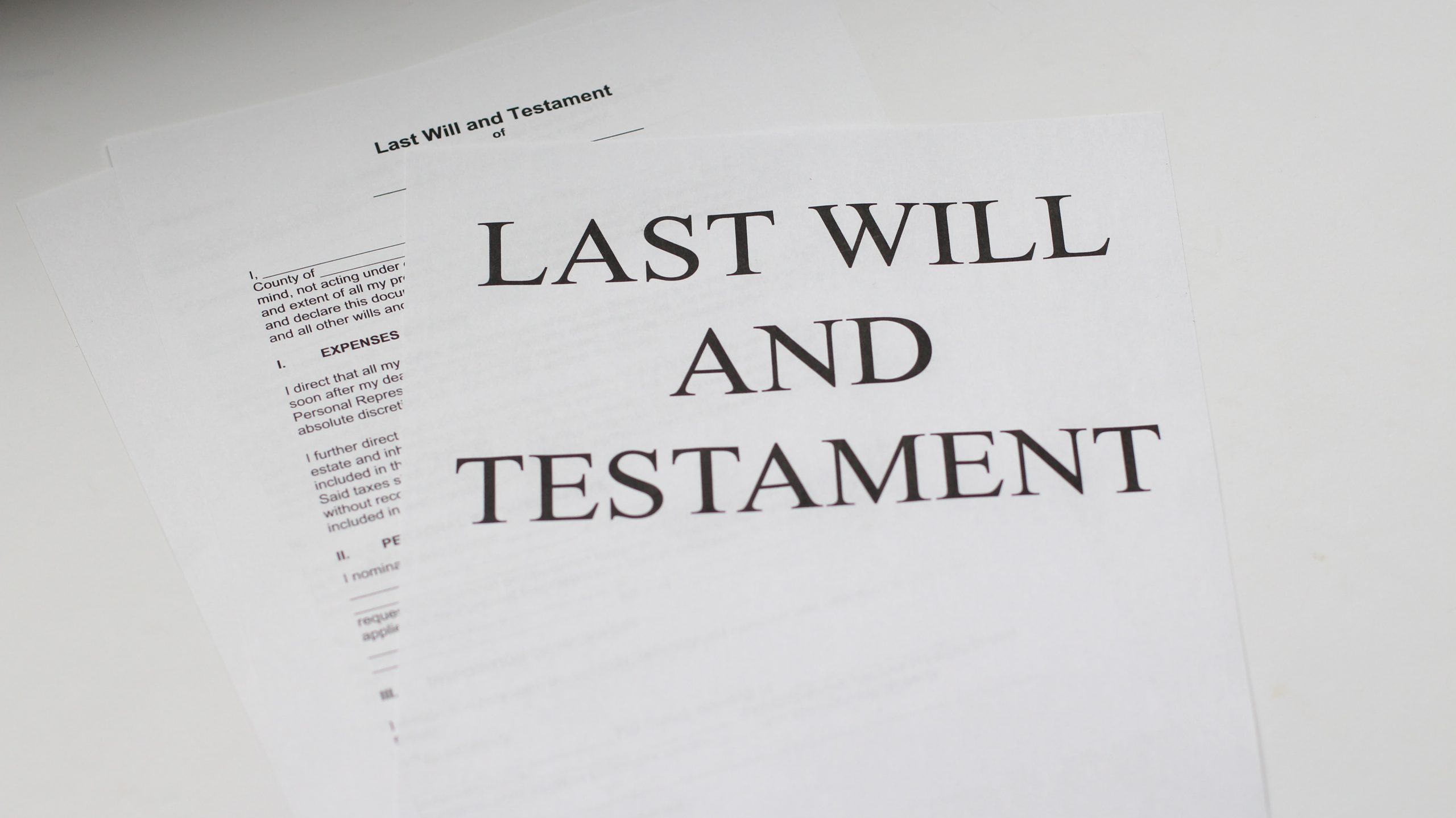Every day someone is trying to protect their intellectual property rights. But what happens to these rights when you die? Do they simply cease to exist? Are they passed on? Can you leave your IP rights to a specific person? Well, the answers to these questions depend on two things. First, it depends on what type of intellectual property rights the deceased person had. Second, it depends upon whether the deceased IP owner specifically said who would receive the right.
Estate Crash Course
Before diving into the intellectual property rights, here is a crash course on what happens to people’s stuff after they die. Everyone has heard of a will – a signed document where a person enumerates who they want to receive their different properties (i.e. house, artwork, or fancy car). Giving property to someone through a will is called a bequest.
Sometimes the person drafting the will may give the property outright, meaning the beneficiary, the person listed in the will, obtains all rights to the property upon their death. Other times they may wish that their property is received under certain conditions. For example, they may wish to give their property to someone, once they reach a certain age. This is done through a trust. But what if someone dies without a will? This means a person died intestate. The answer is in a state statute, such as Illinois, which lists out which family members receive what portion of the property. These beneficiaries, called “the heirs at law,” are said to inherit the property.

Can IP Rights be Inherited?
Now that you know how property can be left to others, let’s consider how to leave specific types of intellectual property.
There are four main areas of intellectual property: copyright, trademark, patent, and right of publicity. Each one has its own set of rules. Below is an explanation of each type and if and how it can be conveyed.
Copyright
First, you need to know what a copyright is. It protects “original works of authorship” (i.e. created, rather than copied from another) that are “fixed in a tangible form of expression,” (i.e. in a tangible form that can be perceived). This can include books, movies, choreography, song lyrics, and a plethora of other expressions.
What matters isn’t who owns the actual work, but who owns the copyright itself. For example, Michael Crichton, the author of Jurassic Park, owns the copyright of the book. But any individual can own a copy of the book itself without violating copyright law. That individual can bequest his copy of Jurassic Park to his daughter through a will, making the daughter the rightful owner of that copy of the book upon his death, but the daughter does not own the right to reproduce the work or turn it into a movie.
When a person, typically the author, rightfully owns a copyright of a work, that right is not extinguished upon death. Instead, that right exists for an additional 70 years past the life of the author. If the owner of a copyright has a will, he can bequest his copyright to whoever he wants. If he dies without a will, his heirs at law will inherit the copyright.
If the new owner, the beneficiary of the copyright dies within those 70 years, the new owner may bequeath the copyright in a will, or her heirs at law will receive it upon her death. After the copyright term expires, the work enters the public domain, meaning that the copyright owner no longer retains any rights to the work. At that point, the intellectual property right can no longer be passed down. Hence why so many theater companies use Shakespeare’s plays; his work is in the public domain. He has been dead since 1616, so there are no copyright protections. This means you do not need to pay royalties, making performance cheaper.
A quirky aspect of copyright law is that copyright owners have a brief window in which they can terminate the license. Essentially, 35 years after the work is first published, there is a 5-year gap in which that license can be terminated. In the event of the copyright owner’s death, their heirs could also take advantage of this window. This only applies when the copyrighted work is authored by one or more individuals, as opposed to a so-called “work made for hire.” A work made for hire is owned by an entity such as an employer even if created by an individual.
The right to terminate the license protects the individual who may have inadequate bargaining power to negotiate a better rate, including the copyright author herself. This rule can also help heirs end agreements that bring in little or no profit. The Copyright Right Act specifically lists out who has these rights and the procedures. The widow or widower of a work by a single author receives the complete right to terminate unless the decedent left behind children. Then the widow/er has a one-half interest and the second half is divided between the decedent’s children and any surviving children of the author’s deceased children. Together, they must decide if the agreement should be terminated and then give notice to the owner of the license.
The same copyright authors who have the right to terminate licenses (but not the copyright owner) also have what is known as moral rights. These rights protect an author’s integrity and right of attribution, meaning the author has the right to claim authorship of his work and prevent others from modifying the integrity of his name. Moral rights also protect works against intentional distortion, mutilation, or other modification as I have previously explained. Unlike copyright protection, which extends after the owner’s death, moral rights end when the author dies. They cannot be passed on.

Trademark
A trademark is a word, phrase, symbol, or design that is used to identify and distinguish the source of particular goods or services. Trademarks can be owned by an individual, but they must be used in commerce on a good or service. So typically, a company is the one who owns the trademark.
When an individual owns the mark and it is transferred to a beneficiary, the executor of the estate must file documents with the US Patent and Trademark Office (USPTO) to record the transfer of the mark to the beneficiary so that the beneficiary can administer the registration of the mark.
A company can be passed down through a will or inherited through intestacy law. When you receive a company, you usually receive the company’s trademarks. The company will still retain its ownership of the trademark rights. However, the beneficiary is the person who controls the company, thus controlling the trademark and how it is used. Remember, as long as a mark is used in commerce and continues to identify and distinguish its source, it does not expire. So unlike copyrights and patents, trademarks can be passed down for a very long time.
Patent
Patents grant property rights to inventors if their invention meets a list of strict criteria. These rights allow the owner of the patent to prevent others from using their invention and from selling or importing the invention. Patent protection lasts for 20 years from the date of filing the application. However, the protection only begins once the USPTO grants the patent.
Often times the inventor signs over their rights to the patent to a company, which can then carry out mass production of the said invention. When the inventor dies, he no longer owns the patent, so there is nothing to transfer.
However, if the inventor still owns the patent, he can transfer it through a will or trust. If the inventor did not have a will or trust, it will pass to heirs via intestacy law, like every other right. Similar to trademarks, the new owner must changethe ownership listed with the USPTO. One odd thing about patent law to remember: if the inventor dies before a patent is applied for or during the application process, the estate can apply for the patent.
Right of Publicity
The right of publicity protects a person’s name, image, or likeness from unauthorized commercial use. This is most common with celebrities. It ensures that celebrities are compensated for the use of their name, image, or likeness in connection with a brand, such as Coca-Cola or Nike. But also prevents the association of their name or likeness with a company whose practices they may not agree with.
State law governs the right of publicity. Therefore, you must look to state law to determine who owns the right of publicity of a particular person after he/she dies. Illinois law states that this right is freely transferable and can be given by a will, trust, or intestate succession.
However, intestate succession only allows the right of publicity to be inherited by the decedent’s spouse, parents, children, or grandchildren, eliminating cousins, aunts, and uncles. In Illinois, this right only exists for 50 years after the death. In California, it exists for 70 years after the death.
Be Specific
Intellectual property rights can be passed down, but in order to ensure that the beneficiaries are who you want, you must draft a will and specifically list who will receive your intellectual property rights. If not, your beneficiaries are dictated by state law.

Madeleine Morris
Associate Blogger
Loyola University Chicago School of Law, JD 2022
